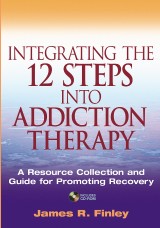Details

Integrating the 12 Steps into Addiction Therapy
A Resource Collection and Guide for Promoting Recovery1. Aufl.
|
58,99 € |
|
| Verlag: | Wiley |
| Format: | |
| Veröffentl.: | 20.10.2004 |
| ISBN/EAN: | 9780471678366 |
| Sprache: | englisch |
| Anzahl Seiten: | 408 |
DRM-geschütztes eBook, Sie benötigen z.B. Adobe Digital Editions und eine Adobe ID zum Lesen.
Beschreibungen
All the resources needed to fully integrate a 12-step approach as part of your overall treatment program<br /> <br /> Millions of Americans have at some time in their lives participated in a 12-step program for treatment of a chemical or non-chemical addiction. Clinicians recognize that these grass-roots efforts have a very high cure rate. However, little has been written on how to integrate these programs into a traditional therapy setting.<br /> <br /> Integrating the 12 Steps into Addiction Therapy serves as an indispensable resource for clinicians treating addiction patients who are simultaneously enrolled in 12-step programs. This valuable text:<br /> * Contains eight lesson plans and twenty-seven assignments<br /> * Integrates in-depth discussion of 12-step programs with hands-on resources like homework assignments, treatment plan examples, and patient handouts<br /> * Will also benefit 12-step program peer counselors<br /> * Includes companion CD-ROM with fully customizable homework assignments, lesson plans, and presentations<br /> <br /> <br /> Treating addictions-whether chemical or non-chemical-can be one of the most difficult challenges faced by mental health professionals. For many people, 12-step programs have played a critical role in helping them to manage their addictive behaviors. Integrating the 12 Steps into Addiction Therapy gives psychologists, therapists, counselors, social workers, and clinicians the tools and resources they need to fully utilize these peer therapy program techniques in treating a wide variety of addictions.
Preface. <p>SECTION I—What to Do and Expect (and What Not to Do).</p> <p>Why Integrate 12-Step Work into Addiction Treatment?</p> <p>Anonymity and Confidentiality.</p> <p>Ensuring That Clients Are Participating Effectively in 12-Step Activities.</p> <p>Helping Clients Benefit from Their 12-Step Programs.</p> <p>Positions of 12-Step Programs on Psychotherapy and Medications.</p> <p>Things 12-Step Programs Can and Can’t Do for Clients.</p> <p>Incorporating 12-Step Work into Treatment Planning.</p> <p>SECTION II—Homework Assignments.</p> <p>Exercise II.A Understanding Spirituality in 12-Step Programs.</p> <p>Exercise II.B Finding a Home Group.</p> <p>Exercise II.C Learning from Recovery Role Models.</p> <p>Exercise II.D Finding and Working with a 12-Step Sponsor.</p> <p>Exercise II.E 12-Step Meeting Review/Critique Form.</p> <p>Exercise II.F Step 1: Understanding Powerlessness.</p> <p>Exercise II.G Step 2: Finding Hope.</p> <p>Exercise II.H Step 3: Deciding to Turn It Over.</p> <p>Exercise II.I Step 4: Personal Inventory.</p> <p>Exercise II.J Step 5: Sharing the Step-4 Inventory.</p> <p>Exercise II.K Step 6: Becoming Willing to Change.</p> <p>Exercise II.L Step 7: Asking for Change.</p> <p>Exercise II.M Step 8: Listing People Harmed.</p> <p>Exercise II.N Step 9: Making Amends.</p> <p>Exercise II.O Step 10: Continued Inventory.</p> <p>Exercise II.P Step 11: Improving Conscious Contact.</p> <p>Exercise II.Q Step 12: Carrying the Message.</p> <p>Exercise II.R Special-Occasion Relapse Prevention in 12-Step Recovery.</p> <p>Exercise II.S Using 12-Step Literature.</p> <p>Exercise II.T 12-Step Recovery Issues for Young People.</p> <p>Exercise II.U 12-Step Recovery Issues for Women.</p> <p>Exercise II.V 12-Step Recovery Issues for Gay-Lesbian-Bisexual-Transgendered People.</p> <p>Exercise II.W 12-Step Recovery Issues for People of Non-Christian Faiths.</p> <p>Exercise II.X 12-Step Recovery Issues for Members of Minorities.</p> <p>Exercise II.Y 12-Step Recovery Issues in Jail or Prison.</p> <p>Exercise II.Z 12-Step Recovery Issues for People with Co-Occurring Mental/Emotional and/or Physical Illnesses.</p> <p>Exercise II.AA Understanding 12-Step Recovery for Loved Ones of People with Addictions 174</p> <p>Section III—Lesson Plans.</p> <p>Lesson Plan III.A What to Expect in a 12-Step Group.</p> <p>Lesson Plan III.B 12-Step Meeting Review and Analysis.</p> <p>Lesson Plan III.C Problems and Solutions in Early 12-Step Recovery.</p> <p>Lesson Plan III.D The 12 Steps, Relationships, and Work.</p> <p>Lesson Plan III.E The 12 Steps and Financial Self-Management.</p> <p>Lesson Plan III.F The 12 Steps and Emotional and Mental Problems.</p> <p>Lesson Plan III.G The 12 Steps and Social Life.</p> <p>Lesson Plan III.H 12-Step Relapse-Prevention Tools.</p> <p>APPENDIX A: Useful Books and Films Related to 12-Step Work.</p> <p>APPENDIX B: The 12 Steps and 12 Traditions.</p> <p>Index.</p> <p>About the CD-ROM.</p>
James R. Finley, MA, is a seasoned therapist, educator, and manager, specializing in addictions and group family therapy. He is coauthor of Addiction Treatment Homework Planner, Second Edition and The Chemical Dependence Treatment Documentation Sourcebook, both from Wiley.
All the resources needed to fully integrate a 12-step approach as part of your overall treatment program <p>Millions of Americans have at some time in their lives participated in a 12-step program for treatment of a chemical or non-chemical addiction. Clinicians recognize that these grass-roots efforts have a very high cure rate. However, little has been written on how to integrate these programs into a traditional therapy setting.</p> <p>Integrating the 12 Steps into Addiction Therapy serves as an indispensable resource for clinicians treating addiction patients who are simultaneously enrolled in 12-step programs. This valuable text:</p> <ul> <li>Contains eight lesson plans and twenty-seven assignments</li> <li>Integrates in-depth discussion of 12-step programs with hands-on resources like homework assignments, treatment plan examples, and patient handouts</li> <li>Will also benefit 12-step program peer counselors</li> <li>Includes companion CD-ROM with fully customizable homework assignments, lesson plans, and presentations</li> </ul> <p>Treating addictions–whether chemical or non-chemical–can be one of the most difficult challenges faced by mental health professionals. For many people, 12-step programs have played a critical role in helping them to manage their addictive behaviors. Integrating the 12 Steps into Addiction Therapy gives psychologists, therapists, counselors, social workers, and clinicians the tools and resources they need to fully utilize these peer therapy program techniques in treating a wide variety of addictions.</p>
Diese Produkte könnten Sie auch interessieren:

The Wiley-Blackwell Handbook of Childhood Social Development

von: Peter K. Smith, Craig H. Hart

136,99 €
















